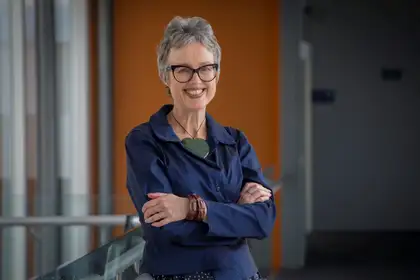
Provost Professor Giselle Byrnes.
The COVID-19 pandemic and the global emergency it has ushered in has exposed many ‘big issues’ in terms of access to and the capacity of our healthcare systems, the inequity of casual employment, personal safety and wellbeing, and, in my own sector especially, access to education, digital proficiency and competence. In New Zealand, it would be fair to say that most of us are grateful for the ‘go hard and go early’ approach adopted by our government and our approach to coping with life in lockdown has something of the spirit of communal wartime austerity. New Zealanders typically take great pride in ‘making do’ and this is now being put to the test.
The current crisis is also throwing a spotlight on those things we take for granted and one of these is the role of the expert in our society.
While elsewhere in the world other nations’ leaders are being guided by political advisors (and possibly financial soothsayers), here in New Zealand public health experts, epidemiologists, statisticians, mathematicians, economists have been thrust into the media. It is to their sound advice, based on peer-reviewed evidence and deep research, that government has turned to guide the everyday decision-making process, balancing the desire to return to ‘business as usual’ against health, safety and biosecurity considerations. Psychologists, social scientists and philosophers have also been offering advice on how to cope with living in isolation, the importance of community resilience and, most importantly, how kindness and tolerance is so critical at this time.
It is noticeable that most of these experts come from the nation’s eight publicly-funded universities.
This underscores the value of universities and the utility of both pure and applied research; not simply as a key part of the national reconstruction effort, but as a fundamental part of civil society. New Zealand universities are charged, under the Education Act 1989, with being ‘primarily concerned with more advanced learning, the principal aim being to develop intellectual independence’, where ‘their research and teaching are closely interdependent and most of their teaching is done by people who are active in advancing knowledge’. In addition, it is expected that in conducting this work, university academics ‘meet international standards of research and teaching’.
Notably, too, universities and their staff are privileged to exercise academic freedom, enshrined in the 1989 Act as ‘the freedom of academic staff and students to engage in research’ and the freedom of academic staff and students, within the law, to question and test received wisdom, to put forward new ideas and to state controversial or unpopular opinions. I mention academic freedom specifically here as the freedom to research new and sometimes uncomfortable or unpopular subject matter is a precursor to discovery, creativity and advancing new knowledge. While the exercise of this freedom comes with responsibility (and accountability), it is nonetheless a vital part of how a university functions in a modern democracy. This is precious and is worth protecting; after all, no other institution in our society has this mandate or role. Universities help us to make sense of who we are, and how we function in the world around us.
It is true that the focus of the university sector over the past six weeks has been on the transition to online teaching and learning; the imperative to pivot to online delivery and ensure continuity of learning for students will remain a priority for the foreseeable future. My own university, a long-time provider in ‘distance’ and flexible learning, made this transition to online extremely well, even in those subject areas where, prior to the COVID-19 emergency, online teaching and learning and effective student engagement was considered more or less impossible. While work remains to ensure the focus on high quality teaching is sustained – and noting there are fundamental differences between ‘emergency’ online teaching on the one hand and teaching and engagement that is deliberately designed for the online medium on the other – this is undoubtedly where all New Zealand universities have been placing their energies. It has been a magnificent effort.
Alongside this, the nation’s academics have, on a regular basis, been providing evidence-based expertise to key decision-makers, government agencies and the public authorities. And government has been listening. It is worth remembering that, in addition to teaching (online, on-campus and blended modes), universities exist as repositories and generators of knowledge. Universities are places that produce graduates for the world of work, and function as sites of rational critique in the context of public policy and social and economic debates. They are also large and influential institutions in our society, and most importantly, they produce graduates who create more cohesive, productive and tolerant communities.
In a world where information is now just a click away and seemingly ubiquitous, and where the veracity of that information is often unknown, it has become patently clear that universities are not just purveyors of content; rather, they create and curate knowledge and information, interpreting it and helping to explain it. Academics, in their dual role as researchers and teachers, play an active and critical role in this process, in educating students and the public alike. In an era where science, evidence-based research and rational thinking are frequently dismissed as ‘fake news’, we need our experts now more than ever.